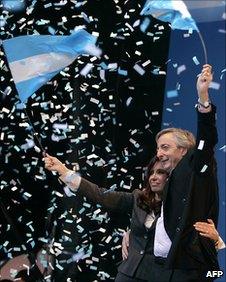Former Argentine President Nestor Kirchner dies
- Published
Crowds gathered in Buenos Aires to mourn Mr Kirchner's death
Argentina's former President, Nestor Kirchner, has died at the age of 60 after suffering a heart attack.
Mr Kirchner served as president from 2003 to 2007, and was being tipped to stand for election again in 2011.
His wife, Cristina Fernandez de Kirchner, succeeded him as president in 2007, after he had overseen Argentina's recovery from a severe economic crisis.
Mr Kirchner, who had a heart operation in September, died in El Calafate in southern Argentina.
The couple had faced some criticism within Argentina for appearing to get around presidential term limits by stepping aside for each other, and suffered a setback last year when their Peronist party lost its absolute majority in both houses of Argentina's Congress.
Health issues
A lawyer by training, Mr Kirchner served as mayor of Rio Gallegos, his hometown in Argentina's Patagonian south, before becoming governor of the wider region - the oil and gas-rich province of Santa Cruz.
He was elected president after Argentina had seen a series of presidents come and go following a major financial crisis in 2001.
Mr Kirchner died with his wife by his side after being admitted to hospital in El Calafate in the early hours of Wednesday morning, reports said.

The Kirchners were a dominant force in Argentine politics
In Venezuela, President Hugo Chavez announced three days of national mourning, and praised Mr Kirchner as someone who fought for international justice.
"I think the bells should chime in Venezuela and in the whole of Latin America and in all the places where they struggle for a world of equals, for a world of peace," said Mr Chavez.
US Secretary of State Hillary Clinton said her country mourned with all Argentines.
"They have lost a leader and the Kirchner family has lost a beloved husband and father. Today our thoughts and prayers are with the president and her children," she said.
Chilean President Sebastian Pinera said his death represented a "great loss" for Latin America.
"He was a man who dedicated his life to public service for the whole world," said Mr Pinera.
Mr Kirchner had been been dogged by ill-health since leaving office in 2007 and had undergone two major operations in 2010 alone.
In February Mr Kirchner had surgery to remove a blockage in his carotid artery, which carries blood to the brain.
He had emergency angioplasty in September, when he complained of numbness in his legs and routine tests revealed a blocked coronary artery.
Economic recovery
As president Mr Kirchner encouraged changes in Argentina's justice system that set in motion dozens of trials against members of the 1976-1983 military government, who were accused of human rights abuses.
He oversaw Argentina's recovery from the country's economic crisis in 2001 and 2002, and many Argentines credit him with fighting poverty and unemployment.
However, Mr Kirchner and his wife also faced allegations that they used their influence over local authorities to accumulate wealth.
The couple denied the claims. According to their own statements, the Kirchners made most of the money through property deals in Santa Cruz, the province Mr Kirchner governed before becoming president.
The politician was confrontational towards his opponents, and some critics called Mr Kirchner authoritarian.
He also sharply criticised big business, and his unorthodox economic policies were unpopular with investors.
While the Argentinian stock exchange was closed due to a public holiday on Wednesday, Argentine bond prices gained after the news of Mr Kirchner's death.
Since leaving office Mr Kirchner continued to remain politically active despite his health problems.
He had remained a member of the Argentine congress and secretary general of the South American regional grouping, Unasur.
With that role he maintained political influence beyond the borders of Argentina, playing a role in disputes and issues across South America, including in recent civil unrest in Ecuador.
- Published27 October 2010
- Published27 October 2010
- Published27 October 2010
- Published27 October 2010